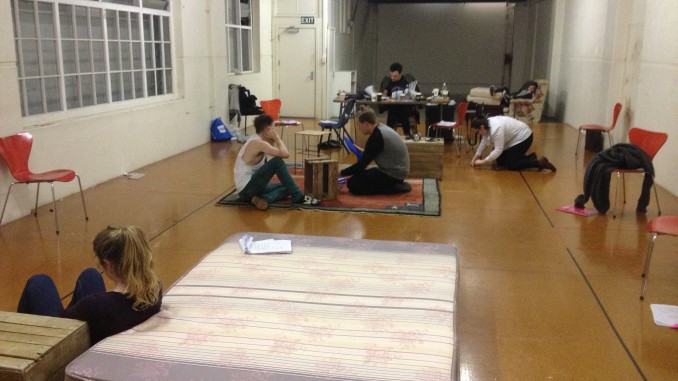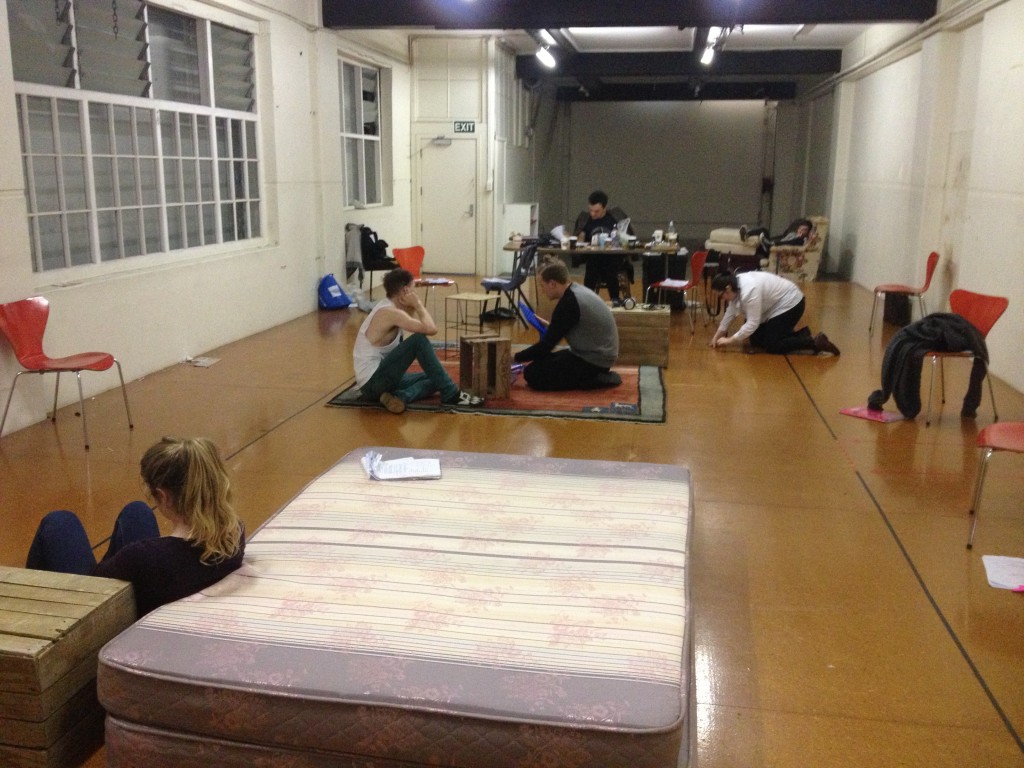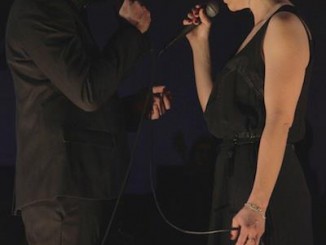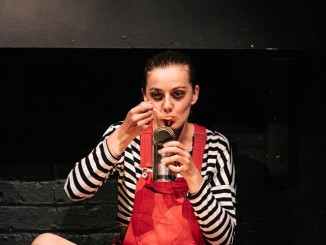
Another Sam Brooks [by James Wenley]

Another Dead Fag happens to be Sam Brooks’ third production at The Basement theatre this year. A playwright who creates juicily complex characters, his words seem to spring from both a personal and societal consciousness. His is a young voice working in the theatre worth listening to – helped by consistently booking slots at The Basement and therefore needing plays to fill them. I asked Sam (who also writes quality reviews for The Lumiere Reader) about his storytelling, his “queer” role, and his new play, which throws “the spotlight on not just a gay issue, but a social issue”: suicide.
Why is Another Dead Fag a story you wanted to tell?
For me, there’s two stories within Another Dead Fag that I wanted to tell. One is the story about youth suicide, which is something that we’re still not talking about in our literature and art. It’s all well and good to hear about it on the news, but I don’t feel like it generates the kind of discussion that I really want to generate with this play. My goal was to deal with suicide in a way that takes both the act and the person seriously and with empathy.The other story, which is also important to me as a writer, is telling a story that removes queer characters from inevitable narratives of self-harm, depression and suicide. Being queer does not mean you will commit suicide, or that you will be depressed. I feel we’ve seen those stories for the last fifty years in not only queer theatre, but queer literature, and we are long overdue to examine why these narratives are being returned to, and to branch out from them.
Suicide is a fairly taboo subject, were you apprehensive about approaching it?
Not at all. Suicide is taboo because people don’t talk about it, what I hope this play does is make the discussion of suicide less taboo, and to generate talk around suicide prevention. I was conscious of being delicate with the subject matter in a way that doesn’t pander to shock value or easy triggers, but it was still important to me to portray the truth of what the plays deals with: The aftermath of a suicide and the life leading up to it.
Your previous plays Queen, And I was Like, Goddess and Mab’s Room have all featured fascinating characters that happen to be gay. You seem like one of the few New Zealand playwrights consistently giving voice to queer identities, and not in a stereotypical way. Is this a role that you chose for yourself? How do you perceive your role and voice?
I wouldn’t say it’s a role I’ve chosen for myself so much as it is a role I’ve fallen into. I’m gay. My protagonists tend to be gay, I tend to write about gay characters. I’ve never written a play without a gay character. It’s not so much that I’m actively trying to tell those stories so much as those are the stories that come out, so to speak.
On the other hand, I’m also aware that there is a dire lack of queer theatre in this country. I can count on one hand the amount of queer shows (a dubious and nebulous term as you’re likely to find) produced in Auckland this year and three of them are mine, and all of them were put on at The Basement, which is doing fantastic work in this regard.
I’m not arrogant enough to call myself an important voice or even a singular one, but I do think I’m filling a gap in New Zealand theatre, and in a way that I hope encourages others to do the same.
In one of your blogs you talk about being a “reluctant” writer-producer. What are the challenges (and appeal) of producing your own work?
The main challenge of producing my own work is learning how to do it. This is where the reluctance comes from. This is my fifth time around the racetrack, so I’m a lot more comfortable and I’ve had a lot more time to prepare and get the show and its publicity ready. I’m lucky enough that some of my general life skills like organisation and overworking lend themselves well to producing, but it’s still a lot of work and it’s a challenge every time.
The main appeal of producing my own work is that my work gets put on. If I didn’t submit for a slot at The Basement in my last year of uni, I wouldn’t have had a play put on last year. If I didn’t do two submissions at the end of last year and one midway through this year, I wouldn’t have had any plays on put this year. It’s also been the jumping board for my other writing work, which I’m making a living from. That eclipses all the other advantages of putting my own work on, although having a degree of control, not necessarily creatively, over what is actually put on stage is always a comfort.
How has the play changed since the director and actors took “ownership” of the work? Tell me about the team that’s been assembled.
The play hasn’t changed a lot since rehearsals. I’ve done my usual trimming and changing some things for boring production reasons (goodbye pointless smoking!) but otherwise it’s been the usual process of translating the work from black lines on a page to actual people, images and stories.
I’ve got an amazing committed team, and I’m seriously impressed with the vision that Zinnie Selwyn has for the piece and the way he shapes the text into something better every single rehearsal. I’ve never worked with any of the actors in this capacity before but it’s a real treat to see Chris [Parker], Lauren [Gibson], Dan [Veint] and Jordan [Blaikie], who are all actors I’ve seen in other stuff and super lovely friends, dig into this work and bring my words to life.

Tell me more about your background. When did you realise writing a play was a viable mode of expression? (Is it a viable mode of expression?)
My background isn’t super interesting! Middle-class mixed-race-ish Auckland boy. I really only got into theatre in my second year of uni (2010), when we started having more intense classes with Gary Henderson. I realised that my natural skills as a writer (dialogue, sense of structure) were suited to theatre and I loved hanging out with actors, so I went from there. I wrote a terrible short play that year, and I also saw the ATC production of August: Osage County, which changed my life. After that, I wrote two plays in my final year and put them both on the year after. The rest is documented on Theatreview, Theatrescenes and my iTicket Box Office account.I don’t think of playwriting as ‘expressing myself’ so much as I think of it as telling the stories I want to tell, and stories that I think need to be heard. It might be a workmanlike way of looking at it, but when I write a play it’s with the clear rule that I’m not writing this for myself, I’m writing this for an audience. Expressing myself isn’t as important as making sure the audience gets what I want them to get. Which might be my own long-winded way of saying ‘expressing myself’.
What other writers – locally and internationally – do you admire?
Aside from friends who would be embarrassed if I name checked them here, Gary Henderson and Victor Rodger locally. They’re both doing the kind of bracing, intelligent work that nobody else in the old guard of theatre is doing. They also taught me the two most important things I’ve learned about writing. Respectively, “A play is only about one thing” and “Where’s the heart?”
Internationally, Tracey Letts, Edward Albee, Katori Hall and August Wilson. August: Osage County, Who’s Afraid of Virginia Woolf?, The Mountaintop and Fences are my four right arm plays – plays I would give my right arm to have written.
What’s your process when writing and redrafting a play? Writing binge, short chunks, a combination?
It depends on the play! Another Dead Fag came on during a fairly horrid trip to Wellington last year. I came up with it on the Monday, planned it that week and wrote it over the next fortnight. I feel the spontaneity of the structure reflects that process. But on the other hand the next play I’m writing is something I’ve been planning for over a year, and it’s really needed that time to let all the bad ideas fall to the wayside or turn into good ideas.Redrafting is more iffy. I’ll usually leave a first draft for a while, even after a workshop, and then suddenly spend a rabid night editing, cutting and rewriting. I’m not one for a long, drawn out process of rewriting.
What do you hope audiences will take away from Another Dead Fag?
Honestly, I’ve had so many responses to the play, its content and what people think its about that I just hope they take something away to think about. Whether it’s, “Suicide IS a problem in our society” or Being queer doesn’t mean being suicidal” or even “Being alive is hard”, it means it sticks in somebody’s brain. Seriously the best compliment somebody can give me is that they’re still thinking about it; theatre’s not meant to stop when you start clapping. It’s meant to stick in your brain and question your way of thinking. So I guess that’s what I hope Another Dead Fag does.
Another Dead Fag is presented by Smoke Labours Production and plays at The Basement Studio from Tuesday 29 October until Saturday 2 November, 7pm. Details see The Basement.
For more on the play and the process, Sam has been blogging his experience of being a writer in the rehearsal room, which makes for interesting reading: Part One | Part Two | Part Three




Leave a Reply